Grammy Award for Best Male Country Vocal Performance
Der Grammy Award for Best Male Country Vocal Performance, auf deutsch „Grammy-Auszeichnung für die beste männliche Country-Gesangsdarbietung“, ist ein Musikpreis, der von 1965 bis 2011 von der amerikanischen Recording Academy im Bereich der Country-Musik verliehen wurde.[1]
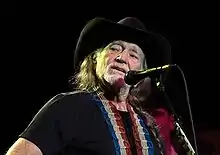
Geschichte und Hintergrund
Die seit 1959 verliehenen Grammy Awards werden jährlich in zahlreichen Kategorien von der Recording Academy in den Vereinigten Staaten vergeben, um künstlerische Leistung, technische Kompetenz und hervorragende Gesamtleistung ohne Rücksicht auf die Album-Verkäufe oder Chart-Position zu würdigen.[2]
Eine dieser Kategorien war der Grammy Award for Best Male Country Vocal Performance.[3] Der Preis wurde von 1965 bis 2011 vergeben und ging im ersten Jahr an Roger Miller für sein Lied Dang Me. Die Kategorie hatte mehrere geringfügige Namensänderungen:
- Von 1965 bis 1967 hieß die Auszeichnung Grammy Award for Best Country & Western Vocal Performance - Male
- 1968 wurde sie in Grammy Award for Best Country & Western Solo Vocal Performance, Male umbenannt
- Von 1969 bis 1994 nannte sie sich Grammy Award for Best Country Vocal Performance, Male
- Von 1995 bis 2011 war die Bezeichnung dann Grammy Award for Best Male Country Vocal Performance.
Die Auszeichnung wurde nach der Preisverleihung des Jahres 2011 in einer umfassenden Überarbeitung der Grammy-Kategorien eingestellt. Ab 2012 werden alle Soloauftritte (männlich, weiblich und instrumental) im Bereich der Country-Musik in der neu gebildeten Kategorie Grammy Award for Best Country Solo Performance ausgezeichnet.
Gewinner und Nominierte
| Jahr | Gewinner | Nationalität | Werk | Nominierte | Bild des/der Gewinner(s) |
|---|---|---|---|---|---|
| 1965 | Roger Miller | Dang Me |
|
||
| 1966 | Roger Miller | King of the Road |
|
||
| 1967 | David Houston | Almost Persuaded |
|
||
| 1968 | Glen Campbell | Gentle on My Mind |
|
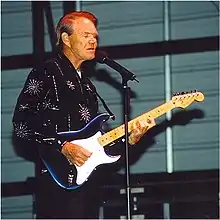 | |
| 1969 | Johnny Cash | Folsom Prison Blues |
|
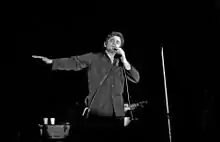 | |
| 1970 | Johnny Cash | A Boy Named Sue |
|
 | |
| 1971 | Ray Price | For the Good Times |
|
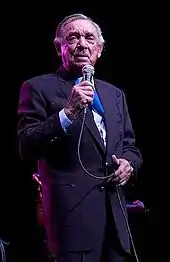 | |
| 1972 | Jerry Reed | When You’re Hot, You’re Hot |
|
||
| 1973 | Charley Pride | Charley Pride Sings Heart Songs |
|
||
| 1974 | Charlie Rich | Behind Closed Doors |
|
||
| 1975 | Ronnie Milsap | Please Don’t Tell Me How the Story Ends |
|
||
| 1976 | Willie Nelson | Blue Eyes Crying in the Rain |
|
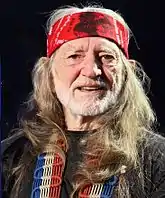 | |
| 1977 | Ronnie Milsap | (I’m A) Stand by My Woman Man |
|
||
| 1978 | Kenny Rogers | Lucille |
|
 | |
| 1979 | Willie Nelson | Georgia on My Mind |
|
 | |
| 1980 | Kenny Rogers | The Gambler |
|
 | |
| 1981 | George Jones | He Stopped Loving Her Today |
|
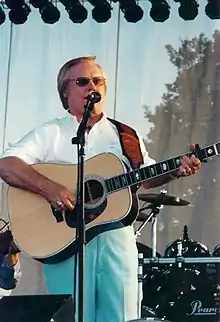 | |
| 1982 | Ronnie Milsap | (There’s) No Gettin' Over Me |
|
||
| 1983 | Willie Nelson | Always on My Mind |
|
 | |
| 1984 | Lee Greenwood | I.O.U. |
|
 | |
| 1985 | Merle Haggard | That’s the Way Love Goes |
|
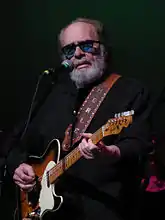 | |
| 1986 | Ronnie Milsap | Lost in the Fifties Tonight (In the Still of the Night) |
|
||
| 1987 | Ronnie Milsap | Lost in the Fifties Tonight |
|
||
| 1988 | Randy Travis | Always & Forever |
|
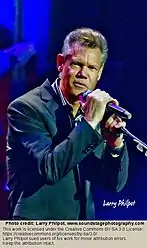 | |
| 1989 | Randy Travis | Old 8x10 |
|
 | |
| 1990 | Lyle Lovett | Lyle Lovett and His Large Band |
|
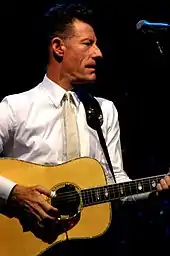 | |
| 1991 | Vince Gill | When I Call Your Name |
|
 | |
| 1992 | Garth Brooks | Ropin’ the Wind |
|
.jpg.webp) | |
| 1993 | Vince Gill | I Still Believe in You |
|
 | |
| 1994 | Dwight Yoakam | Ain’t That Lonely Yet |
|
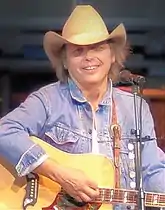 | |
| 1995 | Vince Gill | When Love Finds You |
|
 | |
| 1996 | Vince Gill | Go Rest High on That Mountain |
|
 | |
| 1997 | Vince Gill | Worlds Apart |
|
 | |
| 1998 | Vince Gill | Pretty Little Adriana |
|
 | |
| 1999 | Vince Gill | If You Ever Have Forever in Mind |
|
 | |
| 2000 | George Jones | Choices |
|
 | |
| 2001 | Johnny Cash | Solitary Man |
|
 | |
| 2002 | Ralph Stanley | O Death |
|
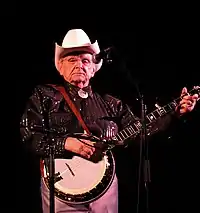 | |
| 2003 | Johnny Cash | Give My Love to Rose |
|
 | |
| 2004 | Vince Gill | Next Big Thing |
|
 | |
| 2005 | Tim McGraw | Live Like You Were Dying |
|
 | |
| 2006 | Keith Urban | You’ll Think of Me |
|
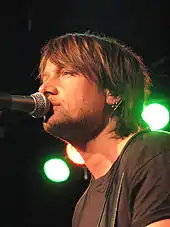 | |
| 2007 | Vince Gill | The Reason Why |
|
 | |
| 2008 | Keith Urban | Stupid Boy |
|
 | |
| 2009 | Brad Paisley | Letter to Me |
|
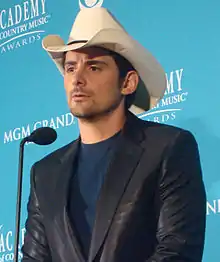 | |
| 2010 | Keith Urban | Sweet Thing |
|
 | |
| 2011 | Keith Urban | ’Til Summer Comes Around |
|
 | |
Fakten zur Kategorie
Meiste Gewinne
| Platz | 1 | 2 | 3 |
|---|---|---|---|
| Künstler | Vince Gill | Ronnie Milsap | Johnny Cash and Keith Urban |
| Anzahl der Gewinne | 9 | 5 | 4 |
Weblinks
- Offizielle Website der Grammy Awards – Recording Academy, Los Angeles (englisch)
- Gewinner des Grammy Award for Best Male Country Vocal Performance bei grammy.com (englisch)
Einzelnachweise
- Grammy Awards. Abgerufen am 30. Juni 2019 (englisch).
- The Official Site of the Grammy Awards – Overview. Abgerufen am 30. Juni 2019 (englisch).
- GRAMMY Awards Winners for Best Male Country Vocal Performance. Abgerufen am 30. Juni 2019 (englisch).